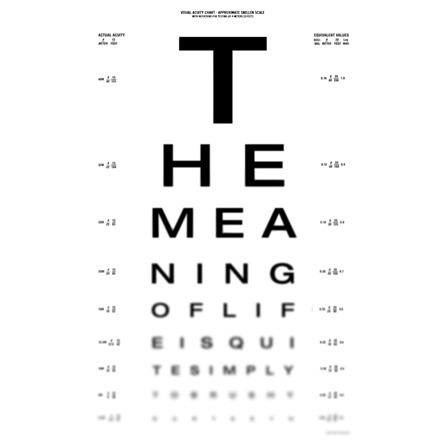Tuesday, October 09, 2012
Friday, October 05, 2012
Friday, September 21, 2012
Tuesday, September 18, 2012
Sunday, September 16, 2012
Friday, September 14, 2012
How do we find meaning in life?
Human beings certainly gravitate to religion and it seems we all have an tendency to believe in some sort of karma. Your mind may require meaning. Studies show it's one of the key factors underlying happiness and motivation.
So what is meaning in life and what does research say about how we might be able to find it?
Stories
Studies have shown that stories are key to some of the most fundamental parts of our lives: increasing happiness, group solidarity and meaning in life.
Some research indicates that to have meaning in your life you must have a story. You need to reflect on how things could have been and why they turned out the way they did. Seeing that things had a direction and a purpose provides meaning.
- Studies show that a good portion of the benefit from religion comes from the meaning it gives to life.
- Looking back on our lives necessitates a narrative so it's not surprise that nostalgia increases feelings of meaning in life.
- The stories we tell do reveal who we are.
- The reason people commit suicide is because they don't live up to the standards of the stories they tell themselves.
Fundamentally, our brains may not be able to tell the difference between the real and the story.
But stories also distort the world. People who watch lots of TV are less accurate judges of reality. Fiction makes makes our perspective less accurate.
What's even more interesting is the truth may not matter. Feeling that you know yourself creates a strong sense of meaning in life -- whether or not you actually know yourself doesn't make a difference.
That may seem depressing but it also means that you can craft the stories in your life to build meaning and fulfillment.
Timothy Wilson, author of Redirect: The Surprising New Science of Psychological Change, has talked about how the process of "story-editing" can help us improve our lives:
The idea is that if we want to change people's behaviors, we need to try to get inside their heads and understand how they see the world—the stories and narratives they tell themselves about who they are and why they do what they do.
So how can you decide what is really meaningful?
Your own regrets and the most common regrets of the dying might lead you in the right direction.
How can you shape the story?
Thinking about your funeral (morbid as it may sound) can help you envision the story you would like told about your life.
How do you make the story part of your life?
Be the story you tell yourself.
Again, Timothy Wilson:
...the "do good, be good" method. It capitalizes on the tried-and-true psychological principle that our attitudes and beliefs often follow from our behaviors, rather than precede them. As Kurt Vonnegut famously wrote, "We are what we pretend to be, so we must be careful about what we pretend to be." People who do volunteer work, for example, often change their narratives of who they are, coming to view themselves as caring, helpful people. Well-designed studies have shown that teen girls who participate in community service programs do better in school and are less likely to become pregnant.
Join 25K+ subscribers. Get a free weekly update via email here.








